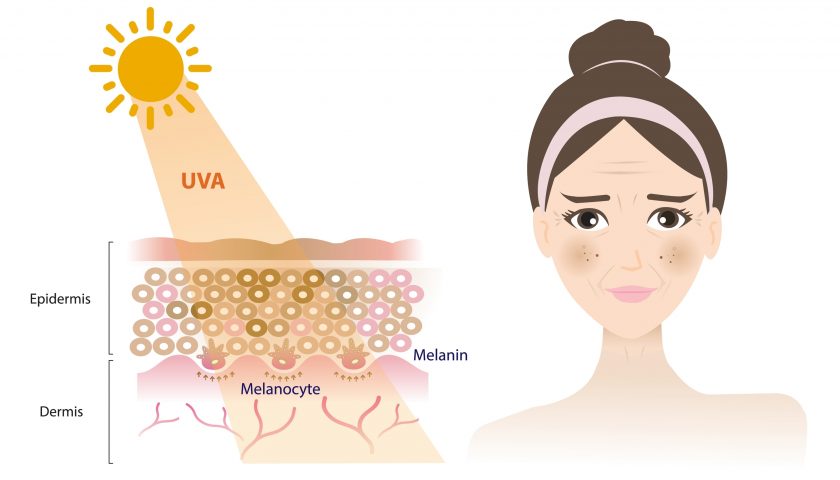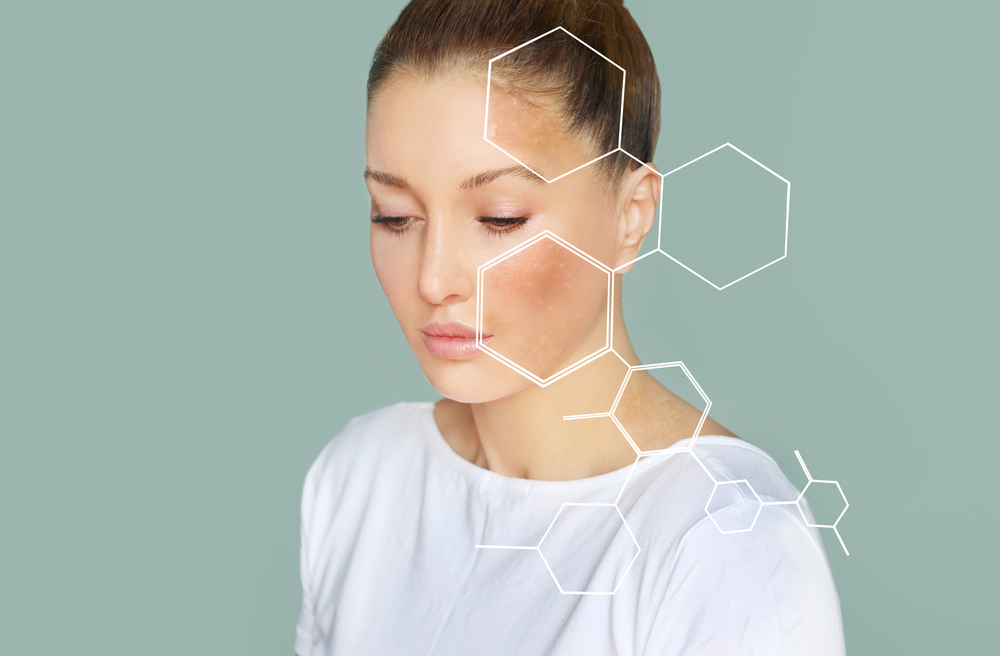Do you ever feel like your skin has a mind of its own? One day it’s clear and radiant, and the next day it’s like a big ol’ canvas for every dark spot and discoloration under the sun. Well, fear not my fellow skin-sufferers, because today we’re tackling one of the most common skincare concerns out there: home remedies for hyperpigmentation!
As a brown girl myself, I know all too well the struggle of dealing with stubborn dark spots around the mouth and other areas. But fear not, because in this blog we’re diving deep into the world of hyperpigmentation. We’ll be exploring what is hyperpigmentation and most importantly, some good old home remedies for hyperpigmentation
So if you’re ready to take control of your skin and show those dark spots who’s boss, buckle up and let’s get started!
Table of Contents
What is Hyperpigmentation?
Hyperpigmentation is a common skin condition that can affect people of all ages, including teenage girls. Essentially, hyperpigmentation is when patches of skin become darker than the surrounding skin. Hyperpigmentation is also referred to as skin melasma. Both of these conditions can happen for a variety of reasons, including sun exposure, hormonal changes, and certain medical conditions.
Here is an easy way to understand..
Imagine if you had a colouring book and you colored in one area more than the others. That area would be darker than the rest of the picture, right? It’s kind of like that with your skin. Sometimes, certain areas of your skin can get darker than the rest of your skin, and that’s called hyperpigmentation.

But the root cause for pigmentation goes deeper than that. Our cells create melanin that is responsible for darkening the color of your eyes, hair, and skin. Although melanin production is based on your genetics, it has been passed down to us for a good reason!
Melanin helps deflect harmful ultraviolet rays of suns. In simpler words, if you are someone who lives near a tropical region where the sun is most exposed throughout the year, chances are you will have melanin in your skin.
Therefore, the more you expose your skin to the sun, the greater the amount of melanin your body produces.
Where does Hyperpigmentation Happen the Most?
Hyperpigmentation can happen anywhere on your body, but it’s especially common on the face. You might notice dark patches around your mouth, on your forehead, or on your cheeks. These patches can be caused by things like spending too much time in the sun without protection, hormonal changes (like during puberty), or certain medications.
The good news is that there are things you can do to help prevent and treat hyperpigmentation. Wearing sunscreen every day, even on cloudy days, can help protect your skin from the sun’s damaging rays. Using gentle skincare products and avoiding harsh chemicals can also help keep your skin healthy.
You can also get onboard with a top dermatologist to help understand your hyperpigmentation treatment in detail.
Natural Home Remedies for Hyperpigmentation
With the right care and treatment, you can improve the appearance of your skin and feel more confident in your own skin. One approach that you may find meaningful is to focus on using natural ingredients that are known to be safe and gentle on the skin.
Here are Some of our tested skin care packs for melasma treatments at home examples include:
Yogurt and Turmeric Pack
Mix 1 tablespoon of plain yogurt with 1/2 teaspoon of turmeric powder to form a paste. Apply the paste to the affected area and leave it on for 15-20 minutes before rinsing it off with warm water. Yogurt is very beneficial as it contains lactic acid, which can help to exfoliate the skin and lighten dark spots, while turmeric has natural brightening properties.
Tomato and Lemon Juice Pack
Mix 1 tablespoon of tomato juice with 1 teaspoon of lemon juice. Apply the mixture to the affected area and leave it on for 10-15 minutes before rinsing it off with cool water. Tomatoes contain antioxidants that can help to brighten the skin, while lemon juice is a natural bleaching agent.
Potato and Honey Pack
Grate a small potato and mix it with 1 teaspoon of honey. Apply the mixture to the affected area and leave it on for 20-30 minutes before rinsing it off with cool water. Potatoes contain enzymes that can help to lighten dark spots, while honey is a natural moisturizer that can help to soothe and heal the skin.
Orange Peel Powder and Milk Pack
Mix 1 tablespoon of orange peel powder with enough milk to form a paste. Apply the paste to the affected area and leave it on for 15-20 minutes before rinsing it off with cool water. Orange peel powder contains natural skin brightening agents, whole milk contains lactic acid and can help to exfoliate the skin.
Papaya and Boiled Rice
Papaya contains enzymes that can help exfoliate the skin and reduce the appearance of pigmentation. White rice is popular for skin brightening and has been used in Chinese beauty recipes for centuries. Mash some ripe papaya with boiled rice and apply it to the affected area for 15-20 minutes before rinsing it off with cool water. You can do this once or twice a week.
Green Tea
Green tea contains antioxidants that can help reduce inflammation and protect the skin from UV damage. Brew some green tea and let it cool before applying it to the affected area with a cotton ball. Leave it on for 10-15 minutes before rinsing it off with cool water. You can do this once daily.
Licorice Root Powder
Licorice root contains a compound called glabridin that has been shown to help reduce pigmentation. Mix some licorice root powder with honey to form a paste. Apply it to the affected area and leave it on for 20-30 minutes before rinsing it off with cool water. You can do this once or twice a week.
Coconut Oil
Coconut oil has natural moisturizing and skin-lightening properties and can help reduce pigmentation. Apply some coconut oil to the affected area and massage it gently for a few minutes before leaving it on for 10-15 minutes. Rinse it off with cool water. You can do this once daily.
Vitamin C Powder
Vitamin C is a powerful antioxidant that can help brighten the skin and reduce pigmentation. Mix some vitamin C powder with water to form a paste. Apply it to the affected area and leave it on for 10-15 minutes before rinsing it off with cool water. You can do this once or twice a week.
Best Skin Ingredients for Hyperpigmentation
When it comes to treating hyperpigmentation as a brown girl, it’s important to remember that there is no one-size-fits-all solution. The most effective remedies may vary depending on the cause and severity of your pigmentation, as well as your individual skin type and sensitivity.
This is important to introduce specially designed chemical formulations early on your treatment for a more targeted pigmentation treatment. Here are some of the pigmentation lightening skin ingredients you must have in your Skin.
Niacinamide
An absolute stunner for your hyperpigmentation! Always look out for a ratio of 3-5% of niacinamide in your daily skincare products.
Tranexamic Acid
one of the most potent chemicals for lightening your skin. If you have stubborn marks, then you must find yourself a good tranexamic acid serum to lighten your pigmentation.
BHA/Salicylic Acid
Salicylic acid or also known as BHA is a very good gentle chemical exfoliant for people of color. It will help dissolve the upper affected epidermis of your skin without causing any irritation to your skin
Hyaluronic Acid
you need it to keep your skin barrier plumped and hydrated. Your pigmentation only becomes worse if your skin is dehydrated
Vitamin C
One of the best antioxidants that can help you reverse your pigmentation in no time. Combine it with a good ferulic acid and you will thank us later!
Retinol
If you have matured pigmentation that has been stubborn and bothersome for years, then your one-stop solution is using retinol. Retinol is a strong potent form of vitamin A that increases cell turnover, which results in more youthful skin. Since vitamin A can be quite strong, you can find its derivative in over the counter prescription form or start off as a beginner with a gentler plant derived form of vitamin A, bakuchiol.
Connect with a Dermatologist
You can consult with top dermatologist Dr Mahvish Aftab Khan for more stubborn skin hyperpigmentation.
Please keep in mind that these remedies may not work for everyone and that it’s always best to consult with a dermatologist before trying any new skincare routine. They can help you determine the best course of treatment for your individual needs and help you achieve healthy, radiant skin.
If you do notice dark patches on your skin, there are treatments that can help. Your dermatologist can recommend creams, serums, or other products that can help lighten the dark patches over time.
